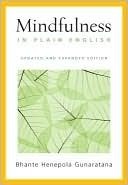More on this book
Community
Kindle Notes & Highlights
The goal is awareness, an awareness so intense, concentrated, and finely tuned that you will be able to pierce the inner workings of reality itself.
Meditation is not a mindless formula that gives automatic and predictable results; you can never really predict exactly what will come up during any particular session. It is an investigation and an experiment, an adventure every time.
Learning to look at each second as if it were the first and only second in the universe is essential in vipassana meditation.
There are three integral factors in Buddhist meditation — morality, concentration, and wisdom.
Patience is essential for any profound change.
The process of becoming who you will be begins first with the total acceptance of who you are.
When you hate somebody, you think, “Let him be ugly. Let him lie in pain. Let him have no prosperity. Let him not be rich. Let him not be famous. Let him have no friends. Let him, after death, reappear in an unhappy state of deprivation in a bad destination for eternity.” However, what actually happens is that your own body generates such harmful chemistry that you experience pain, increased heart rate, tension, change of facial expression, loss of appetite, deprivation of sleep, and you appear very unpleasant to others. You go through the same things you wish on your enemy. Also you cannot
...more
Pain is inevitable, suffering is not. Pain and suffering are two different animals. If any of these tragedies strike you in your present state of mind, you will suffer.
Meditation goes in cycles. You have good days and you have bad days.
Mindfulness looks at everything with the eyes of a child, with a sense of wonder. Mindfulness sees every moment as if it were the first and the only moment in the universe. So look again.
When you let fear run its course in the arena of conscious attention, it won’t sink back into the unconscious.
Beginners in meditation are often much too serious for their own good. It is important to learn to loosen up in your session, to relax in your meditation. You need to learn to watch objectively whatever happens. You can’t do that if you are tensed and striving, taking it all so very, very seriously.
Buddhist thinkers prefer to regard them as “skillful” versus “unskillful.” An unskillful thought is one connected with greed, hatred, or delusion. These are the thoughts that the mind most easily builds into obsessions. They are unskillful in the sense that they lead you away from the goal of liberation. Skillful thoughts, on the other hand, are those connected with generosity, compassion, and wisdom. They are skillful in the sense that they may be used as specific remedies for unskillful thoughts, and thus can assist you in moving toward liberation.
Generosity cancels greed. Benevolence and compassion cancel hatred. You can find a specific antidote for any troubling thought if you just think about it awhile.
Here is the problem: When a distraction, or any mental state, arises in the mind, it blossoms forth first in the unconscious. Only a moment later does it rise to the conscious mind. That split-second difference is quite important, because it is time enough for grasping to occur. Grasping occurs almost instantaneously, and it takes place first in the unconscious. Thus, by the time the grasping rises to the level of conscious recognition, we have already begun to lock on to it. It is quite natural for us to simply continue that process, getting more and more tightly stuck in the distraction as
...more
Our three questions, “What is it? How strong is it? And, how long does it last?” are a clever remedy for this particular malady.
Distractions are really paper tigers. They have no power of their own. They need to be fed constantly, or else they die.
The purpose of meditation is not to concentrate on the breath, without interruption, forever. That by itself would be a useless goal. The purpose of meditation is not to achieve a perfectly still and serene mind. Although a lovely state, it doesn’t lead to liberation by itself. The purpose of meditation is to achieve uninterrupted mindfulness.
Mindfulness grows by the exercise of mindfulness. It is like exercising a muscle. Every time you work it, you pump it up just a little. You make it a little stronger.
Meditation is a bit like mental acid. It eats away slowly at whatever you put it on.
Mindfulness is nonjudgmental observation. It is that ability of the mind to observe without criticism.
There are three fundamental activities of mindfulness. We can use these activities as functional definitions of the term: (a) mindfulness reminds us of what we are supposed to be doing, (b) it sees things as they really are, and (c) it sees the true nature of all phenomena.
It stands back from the focus of attention and watches with a broad focus, quick to notice any change that occurs. If you have focused the mind on a stone, concentration will see only the stone. Mindfulness stands back from this process, aware of the stone, aware of concentration focusing on the stone, aware of the intensity of that focus, and instantly aware of the shift of attention when concentration is distracted.


